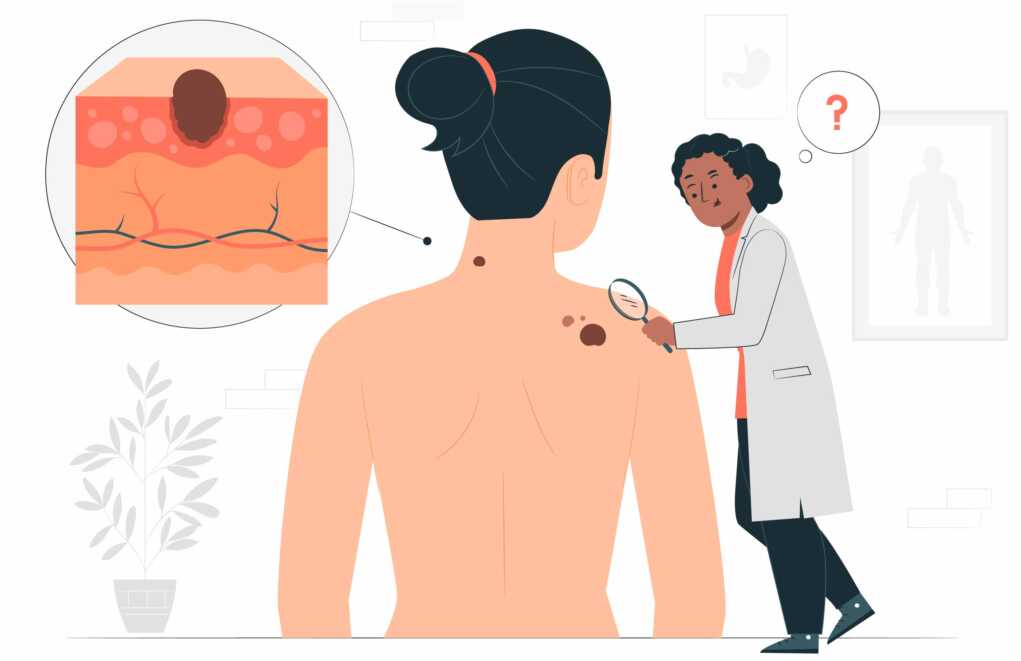
The skin is the human body’s largest organ. Various changes on the outside, in the skin, can reflect the state of the internal organs and, thus, the body’s overall health. Paying attention to what’s happening on the skin can help us detect more severe conditions lurking beneath its surface. Even cancer can be detected and treated early.
Some skin diseases can be considered potential precursors to cancer or may be related to cancer. These types of skin diseases include the following:
- Actinic keratosis: This is a common skin disease usually caused by long-term exposure to ultraviolet radiation. Although most actinic keratoses are benign, a small percentage may progress to squamous cell carcinoma.
- Bowen’s disease: This is a very early form of squamous cell carcinoma, usually appearing as red, expanding patches or scaly skin lesions. It may appear in areas exposed to ultraviolet radiation, such as the face, arms, and legs.
- Melanocytic nevi (melanoma): Most melanocytic nevi are benign, but certain types may develop into malignant melanoma. Characteristics include uneven coloration, blurred edges, larger diameter (usually over 6 millimeters), and changes in appearance.
Some types of cancer can manifest as early symptoms or initial lesions on the skin. Here are some common types of cancer and their possible manifestations on the skin:
- Basal cell carcinoma: One of the most common types of skin cancer, basal cell carcinoma usually originates from basal cells in the skin layer. It typically presents as chronic ulcers, red patches, flat warts, or bead-like lesions.
- Squamous cell carcinoma: This type of skin cancer originates from epidermal squamous cells and may present as red scaly patches, ulcers, or keratosis.
- Malignant melanoma: This is a serious type of skin cancer originating from melanocytes. It typically presents as black or brown moles, with changes in the mole such as uneven coloration, irregular shape, or blurred edges.
Which Cancers Can Spread to the Skin?
Many cancers can spread to the skin during a process known as cutaneous metastasis. If the cancer cells spread to the skin, the cancer has already spread to other parts of the body, so cutaneous metastasis is usually considered a manifestation of late-stage disease.
Here are some types of cancer that may have cutaneous metastasis:
- Breast: Breast cancer is one of the most common cancers in women, and cancer cells can spread to other parts of the body, including the skin, through the lymphatic system or bloodstream. Cutaneous metastasis usually presents as subcutaneous nodules, red patches, or ulcers.
- Lung: Lung cancer is a malignant tumor usually associated with smoking. When lung cancer spreads to the skin, it usually forms hard nodules or lumps.
- Colorectal: Colon and rectal cancers can spread to other organs, including the skin, through lymphatic or blood circulation systems. Cutaneous metastasis usually presents as nodules, lumps, or ulcers.
These are just some common cancers, though others may also spread to the skin. If you notice unusual nodules, lumps, ulcers, or other changes on your skin, consult your doctor for evaluation and further diagnosis. Early detection and treatment of cutaneous metastasis are crucial for cancer management.
Important Notice: This article was originally published at www.theepochtimes.com by Dr. Teng Cheng Liang where all credits are due.
Disclaimer
The watching, interacting, and participation of any kind with anything on this page does not constitute or initiate a doctor-patient relationship with Dr. Farrah™. None of the statements here have been evaluated by the Food and Drug Administration (FDA). The products of Dr. Farrah™ are not intended to diagnose, treat, cure, or prevent any disease. The information being provided should only be considered for education and entertainment purposes only. If you feel that anything you see or hear may be of value to you on this page or on any other medium of any kind associated with, showing, or quoting anything relating to Dr. Farrah™ in any way at any time, you are encouraged to and agree to consult with a licensed healthcare professional in your area to discuss it. If you feel that you’re having a healthcare emergency, seek medical attention immediately. The views expressed here are simply either the views and opinions of Dr. Farrah™ or others appearing and are protected under the first amendment.
Dr. Farrah™ is a highly experienced Licensed Medical Doctor certified in evidence-based clinical nutrition, not some enthusiast, formulator, or medium promoting the wild and unrestrained use of nutrition products for health issues without clinical experience and scientific evidence of therapeutic benefit. Dr. Farrah™ has personally and keenly studied everything she recommends, and more importantly, she’s closely observed the reactions and results in a clinical setting countless times over the course of her career involving the treatment of over 150,000 patients.
Dr. Farrah™ promotes evidence-based natural approaches to health, which means integrating her individual scientific and clinical expertise with the best available external clinical evidence from systematic research. By individual clinical expertise, I refer to the proficiency and judgment that individual clinicians acquire through clinical experience and clinical practice.
Dr. Farrah™ does not make any representation or warranties with respect to the accuracy, applicability, fitness, or completeness of any multimedia content provided. Dr. Farrah™ does not warrant the performance, effectiveness, or applicability of any sites listed, linked, or referenced to, in, or by any multimedia content.
To be clear, the multimedia content is not intended to be a substitute for professional medical advice, diagnosis, or treatment. Always seek the advice of your physician or other qualified health providers with any questions you may have regarding a medical condition. Never disregard professional medical advice or delay in seeking it because of something you have read or seen in any website, video, image, or media of any kind. Dr. Farrah™ hereby disclaims any and all liability to any party for any direct, indirect, implied, punitive, special, incidental, or other consequential damages arising directly or indirectly from any use of the content, which is provided as is, and without warranties.








